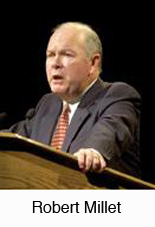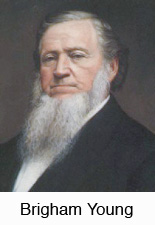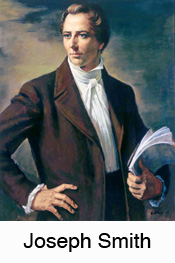Robert L. Millet, formerly the Dean of Religious Education at Brigham Young University, is currently (2005) the Manager of Outreach and Interfaith Relations for [LDS] Church Public Affairs. In this capacity, he has delivered a paper through which he hopes to help LDS Church members respond to critics of the Church. Dr. Millet has admirably attempted to discern and understand why Christians object to Mormonism. After asserting that the growth of the LDS Church is threatening to non-Mormons, he adds, "But there is another reason we are suspect, one that underlies and buttresses large amounts of anti-Mormon propaganda--namely, what they perceive to be some of our 'unusual doctrines,' much of which was presented by a few Church leaders of the past."1

How refreshing to find a Mormon willing to deal with the real issues. It is the "unusual doctrines" that we object to; though we refer to those doctrines by their biblical name: heresy. Christians believe, as the Bible teaches, that we are to cling to and defend the truth as God has delivered it to us in His Word.2 Those preaching a different Gospel, a different Jesus, or a different Spirit are designated "false teachers"; God's people are to expose them and put them out from our midst.3
So how does Dr. Millet instruct Mormons to resolve objections to the Church's "unusual doctrines"? Dr. Millet himself responded to a sincere enquiry about early Mormon prophets' statements on blood atonement by declaring, "Yes, they were taught, but they do not represent the doctrine of our Church."4 In a nutshell, he would like Mormons to deny that these problematic teachings are doctrines at all.
Dr. Millet excuses the blood atonement teachings of Brigham Young and other Church leaders by defining their statements as "revival rhetoric" employed for the purpose of raising the bar "in terms of obedience and faithfulness" among Latter-day Saints. He points out that two books of LDS scripture, the Book of Mormon and Doctrine and Covenants, forbid the taking of a person's life because of disobedience or apostasy.5 In claiming the teaching was merely rhetorical speech, Dr. Millet has not considered historical evidence. Members of the Church took the prophet at his word, some even helping people atone for their sins by shedding their blood for them.6 Regardless, Dr. Millet believes the former teaching of blood atonement, whether true or false, is irrelevant to the Church today.7
According to Dr. Millet, it is the teachings of the living prophets and apostles that concern Church members now.8 In attempting to answer the question, "What is our doctrine?" Dr. Millet offers the following: "...if some teaching or idea was not in the standard works, not among official declarations or proclamations, not in the general handbooks or official curriculum of the Church, or was not taught currently by living apostles or prophets in general conference or other official gatherings, it is probably not a part of the doctrine of the Church. Even if something was said once or even several times by Church leaders of the past, if it does not meet the above criteria, it is not the doctrine of the Church."9
As an example, Dr. Millet offers the common understanding among Mormons that Jesus was conceived via sexual relations between God the Father and Mary. He postulates that this is not a Church doctrine because it does not meet any of the above criteria.10 However, the doctrine was included in both the teaching of a living prophet (1914) and official Church curriculum (1972).11 Are Latter-day Saints obligated to believe this "doctrine" because it met Dr. Millet's criteria at one time; or not, because it isn't officially taught by the current prophet?

"A significant percentage of anti-Mormonism focuses on statements by Church leaders of the past that deal with peripheral or non-central issues," Dr. Millet writes. "No one criticizes us for a belief in God; in the divinity of Jesus Christ or his atoning work;...But we are challenged regularly for statements in our literature on such matters as the following: God's life before he was God; how Jesus was conceived; the specific fate of sons of perdition; teachings about Adam as God;..."12 It is interesting Dr. Millet claims these issues are peripheral, unlike the core teachings he's listed for which, he states, Mormons are not criticized. A closer look at these "peripheral" issues reveals that they all fall into the core categories he's listed. For example, the LDS "belief in God" is defined by "God's life before he was God" and by the Adam-God doctrine. The conception of Jesus Christ in Mormonism is part of the definition of who Mormons believe Jesus to be. The atoning work of Christ is intimately connected to the eternal fate of the "sons of perdition." Far from being unimportant, these doctrines are key to determining the true nature of Mormonism.
Which brings us back to Dr. Millet's main point: What is Mormon doctrine?
While Dr. Millet says it's okay to dismiss the teachings of past prophets and define LDS doctrine by current teachings and the standard works alone,13 Mormon doctrine--as defined by Dr. Millet's own criteria--says otherwise.
The LDS Church Educational System produces a student manual for Institute (college) students to help them understand the role and importance of following living prophets (identified as the president of the Church and LDS apostles14). Teachings of the Living Prophets, Student Manual Religion 333, currently available for sale on the LDS Church web site, has much to say on this topic. For instance, the manual declares that the inspired words of latter-day prophets are actually scripture.15 LDS members have a choice on whether to canonize these revelations; "They cannot, however, invalidate the revelations given to a prophet."16
Dr. Millet would probably agree. The question now becomes: When is a prophet speaking as a prophet?
This is a hard question for Latter-day Saints to answer. Christians, who trust the Bible, have a much easier time of it. God, through His Word, has provided objective tests we are to apply to anyone claiming to speak for God.17 But Mormons recognize no such tests. In Mormonism, the President of the Church may modify, change, or abrogate any scripture or doctrine at any time.18 This being the case, how are Mormons to know if their leaders are speaking God's truth or just giving their private opinion on a matter?
When I began investigating Mormonism in the 1980s I wrote to Church headquarters and asked this very question. The Church sent a nice gentleman to my home who talked about everything except my question for two and a half hours. Finally, when he found he could not leave without providing an answer, he said, "I pray about it and get a burner." In other words, he prayed and based his conclusion on how he felt after his prayer. This is the course he encouraged me to follow as well.
The LDS Church provides no other steadfast criteria by which to judge a prophet's statements. However, in Teachings of the Living Prophets students are told that Church leaders' "discourses to the Saints and their official writings should be considered products of their prophetic calling and should be heeded." Furthermore, a prophet's counsel will always be "timely and beneficial." Even his unofficial expressions "carry greater weight than the opinions of other men."19 Finally, students are reminded that the Prophet and Apostles will never "lead the Saints astray or send forth counsel to the world that is contrary to the mind and will of the Lord."20
LDS leaders have stated that members receive "counsel by inspiration, or revelation, at every general conference of the Church."21 Yet Brigham Young taught that Adam was God at a general conference in 1852--a teaching Dr. Millet would like to dismiss as unimportant.
Another general conference teaching of which Dr. Millet does not seem too fond is the King Follett Discourse. Dr. Millet relates an incident when a reporter asked LDS Prophet Gordon B. Hinckley, "Was God the Father once a man as we are?" President Hinckley danced around the question and finally answered that nobody really knows much about the concept. Dr. Millet says, "I submit that President Hinckley was being both direct and honest...Insights concerning God's life before Godhood are not found in the standard works, in official declarations or proclamations, in current handbooks or curricular materials, nor are doctrinal expositions on the subject delivered in general conference today."22 This is wishful thinking on Dr. Millet's part.

Joseph Smith stated clearly in the King Follett Discourse, "[God] was once a man like us;... dwelt on an earth..."23 A current LDS student manual, Achieving a Celestial Marriage, states, "...our Father in heaven was once a man as we are now, capable of physical death. By obedience to eternal gospel principles, he progressed from one stage of life to another until he attained the state that we call exaltation or godhood."24 There certainly seems to be enough information on this doctrine for President Hinckley to have answered a bit more directly and honestly than he did.
Dr. Millet's paper, What Is Our Doctrine?, offers an easy and painless way for Latter-day Saints to answer critics while not having to face challenges to their own faith. Unfortunately, Dr. Millet is not conforming his teaching to LDS doctrine.
Teachings of the Living Prophets says that when LDS prophets and apostles speak for God their statements are binding upon all who hear.25 It says, the "Prophet Joseph Smith, and the prophets since his time...gave certain great principles that would save the world if the world would but listen. We do not lack a prophet; what we lack is a listening ear..."26 It says, "When God gives a message to mankind, it is not something to be lightly cast aside. Whether He speaks personally, or through His prophets, He himself [sic] said, it is the same."27
A canonized statement found in the LDS Church's 9th Article of Faith states, "We believe all that God has revealed, all that He does now reveal, and we believe that He will yet reveal many great and important things..." In order for Mormons to believe all that God has revealed they are under obligation to believe all the teachings of past prophets whether or not living prophets discuss them in an official setting, whether or not they are doctrine according to Dr. Millet's criteria. Indeed, in the October 2003 general conference, James Faust, a member of the Church's First Presidency, reiterated that LDS members must accept all of the authoritative teachings of Church leaders--past and present.28
Mormonism is a complicated belief system that rests on a foundation of modern-day prophets and continuing revelation. It is constructed of the "unusual doctrines" and heretical teachings of these prophets. If believed, these doctrines lead people away from their only spiritual hope: the one true God and Jesus Christ whom He has sent.29
Many Latter-day Saints place their hope in Mormonism--in their one true Church and in their living prophet. Therefore, we can't ignore the teachings of LDS prophets of the past just because the Church no longer accepts them as doctrine. It is valid--and necessary--to ask how this Church can be "true" if its prophets have taught spiritual "truths" they claimed came from God, but that are no longer true; or, perhaps, that were never true. It is vital to ask about the value of being led by a prophet today whose teachings may be deemed wrong or irrelevant tomorrow.
The truth is, until the LDS Church is ready to surrender its claims of continuing revelation, prophetic leadership, and succession of authority, the teachings of past prophets are relevant--whether promoted by the LDS Church today or not. Help your LDS friends understand that, and help them see the eternal consequences of continuing to turn a blind eye to the problematic teachings of their prophets. Show them the blessed alternative, the true source of hope, Jesus our Lord.